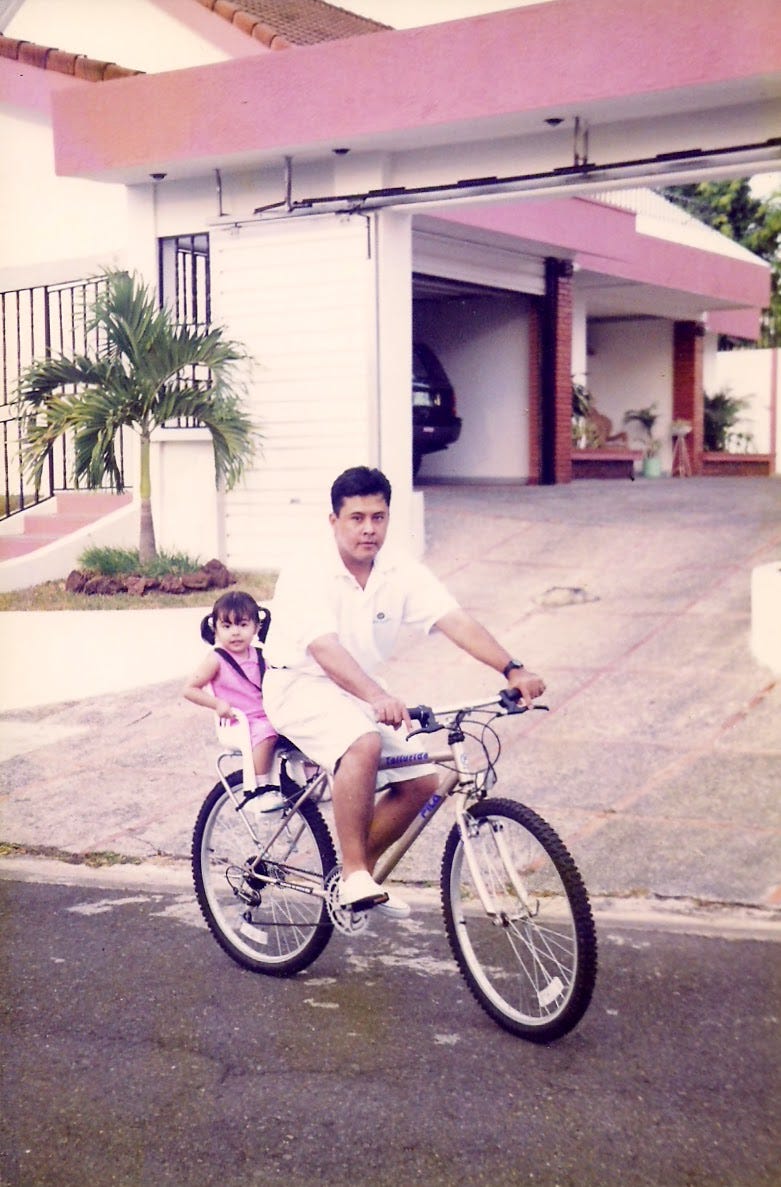“It's about coming to terms with both sides of who I am.”
Author Elizabeth Camarillo Gutierrez on identity, family, and why her memoir is called My Side of the River.
Reflecting on how she’s moved on since some of the incidents described in her book, author Elizabeth Camarillo Gutierrez notes, “I'm so out of their lives and they're so out of mine.” It’s this tremendous act of generosity and healing that allows her to move forward, considering the details she shares in her memoir.
In this second part of our conversation, Elizabeth reflects on the central relationships at the center of her memoir, My Side of the River, including her relationship with her brother and the family that took her in during high school. If you missed the first part of our conversation, please take a look here:
ANTERO GARCIA: Has your brother read your book?
ELIZABETH CAMARILLO GUTIERREZ: He said he's read parts of it. But I don't think he's read the whole thing. I think he's kind of scared of reading it, because he says he doesn't want to re-traumatize himself.
ALIX DICK: I want to ask a question related to the title: My Side of the River. For much of the book, there's a river that separates you and your family, and acts as something of a border between you and your family, between the US and Mexico. When you think of it now, what side is your side?
ECG: Yeah. That river is very real. It is just this dry river in Arizona that was five minutes from us. The area south of it is very immigrant heavy. It's mostly mobile homes. And so this is the area that I grew up in. For my child brain, I was like, "We live in the poor, south part of the river. And up north is where my nice elementary school is. And sometimes it gets blocked when we have monsoon seasons. And my mom always is looking at houses on the other side of the river, and we can't afford the other side of the river. We can only visit, but at the end of the day, we have to come back to our side." For me, there was a lot of shame in where I lived. And I think that was for my entire family. My mom didn't want to live there, and my dad didn't want my mom to feel that way.
I had to learn to accept that this was the price that my parents were paying for my brother and I to have an opportunity at a great education. I had to come to terms that there was the cost, and also learning to accept the community that I come from. Because, I think my parents were always in a way trying to distance us from being poor and brown by putting us in spaces where people were white and rich. Also, growing up, my dad was always like, "Oh, you have to learn the rich people sports." Which are like tennis and golf.
AG: And pickleball now!
I had to learn to accept that this was the price that my parents were paying for my brother and I to have an opportunity at a great education.
ECG: And pickleball. Don't get me wrong, I love tennis, I really do. But it's just that my dad was always like, "Soccer is poor, and softball is bad, and one of your arms is going to get bigger than the other." I was like, "What are you talking about? This is so weird." And so these little things, they were always trying to put me in spaces. For me it was about identifying with the things that are who I am. And obviously I've gone through different stages of privilege. But I’m grateful for my community, for being able to go back to my high school and be like, "Wow, these are the kids that came from similar backgrounds as mine. They're so encouraging and I have so much faith in this generation." Seeing how proud they are of where they come from too, it's really gratifying. I think there was a kid who had a speech and he was like, "My mom doesn't even know I had to do this speech." And then at the end of the speech he spoke to her in Spanish.
For a lot of people, it's taken a lot of time to reconnect with themselves. Obviously, there's a push to some extent, of blending in. And sure, my parents were like, "You can't speak English at home." They did things to protect that in me, but they also were like, "Go into these spaces because it's going to help you grow and be different." So, it's about coming to terms with both sides of who I am.
AD: Thank you for sharing that. Were you always planning to call your book My Side of the River?
ECG: Funnily enough, I was going crazy about the title. I was like, "I don't know what I'm going to call this." And I was talking to one of my friends, Laura Gao, who also wrote a graphic memoir called Messy Roots.
AG: Oh, yeah.
ECG: It's a graphic memoir, which is really great. She was published a little bit ahead of me, so it was really good to have her kind of as a mentor to tell me what the process was going to be like. When I was putting together the package to send to editors, I didn't have a title, and she's like, "You mention the river a lot in these first few chapters." And so she said, "What about My Side of the River?" And I was like, "That's perfect." And it ended up sticking.
And I think my editor really liked it, so it never got changed. I have heard of titles getting changed by editors. I think even Laura's was called something else initially. I got lucky in the sense that there was a lot of agreement about the title.
AG: A central part of your book focuses on a period where you live with the Hernandez family. It’s a complicated relationship. They both open their doors for you, and I think there is a lot of animosity by the end of it. I'm curious if you shared the book with them or if they are aware of it.
ECG: I haven't talked to them since, honestly. They must know. If they don't, that's fine. If they do, that's fine. I'm so indifferent. I'm so out of their lives and they're so out of mine that it's not an expectation or anything. It's just these are some people I encountered and I'm thankful for opening their doors. And at the same time, I've healed a lot from the random scars that I was inflicted upon during my stay there.
And I know that that's a really gripping part of the book. It was really weird thinking about it in hindsight, because when I was a kid I was just like, "I'm so grateful. I'm so grateful. I just need to be here and be quiet."
Looking back, especially after raising my little brother and knowing what it takes to raise a teenager, I'm like, "Wow, I was really neglected in a lot of ways." I don't know how to reconcile that necessarily, because I had my hands tied in doing anything. I but I was just like, "I'm still a hungry kid. I'm still a kid with needs, and I'm still a kid that is persevering and doing my best in school."
At the time, I couldn't make sense of why I was so angry. Today, I can’t make sense of why I wasn't taken care of in a way that a child should be. And my only thought is they were going through a lot of stuff too.
Today, I can’t make sense of why I wasn't taken care of in a way that a child should be.
AG: Your words make me think back to the negative Goodreads reviews you described, about how you should be “grateful.” As if the bare minimum is what you deserve.
ECG: Or require. Like the baseline, right? The baseline is food. But it's fine. For the most part, I think they've been through some stuff too. I don't know if I believe in karma, but I'm like, "They've gone through their own battles and I'm out of that. I don't want to be involved."
All I know is that it was a learning lesson for me too, for my brother. I'm like, "He needs certain things." = I always tell my brother, because he's an authorized user on my credit card, I'm like, "The one thing you never have to ask me about is food. You can always spend money on food. And if your friend is hungry..."
Because a lot of his friends growing up and in high school, they didn't have food. He would text me, he's like, "Can I get my friend, so-and-so, Dunkin' Donuts?" And I say, "You never have to ask me for food. And you never have to ask me about giving to your friends food, because I don't know what kind of hunger they're going through too." And everybody deserves a sweet treat every once in a while.
AD: When you write about this in the book, it hit me in the gut. I've been hungry like that too. You don't understand those things until you experience them. That part of your book really hit home.
ECG: Oh, wow. Thank you for that.
Propina
We’ll conclude our conversation with Elizabeth Camarillo Gutierrez next week. This week is Banned Books Week. If you are looking for a frequently challenged book, we encourage you to take a look at I am Not Your Perfect Mexican Daughter and to take a look at our conversation with the inimitable Erika Sanchez:
“The fact that so many Brown girls across the country have connected to this book makes me believe that I've done the right thing.”
We’ll see you next week.








